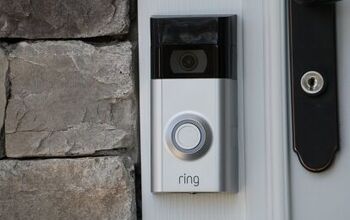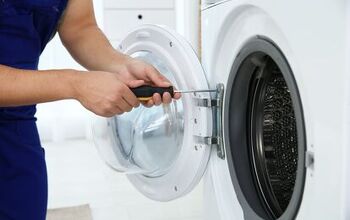What To Do If Your Neighbor’s Dog Won’t Stop Barking

The sound of a neighbor’s dog constantly barking is enough to drive anyone crazy. It’s annoying and it often indicates that your neighbor doesn’t care about the problem if they do nothing to solve it. Understandably, you may be left at a loss for what to do if your neighbor’s dog won’t stop barking.
Speak to your neighbor if their dog won’t stop barking and try to reach a solution. You can even offer to meet the dog, bring them treats, or let it outside throughout the day if that will help. Record each incident if the problem persists in case you need to file a nuisance claim or noise complaint if your neighbor does nothing to help.
Dog whistles and sonic barking deterrent devices also help to stop dogs from barking. You can call the police and make a noise complaint as a last resort if your neighbor’s dog keeps barking and they do nothing to solve the problem. Follow along as we explore what to do if your neighbor’s dog won’t stop barking.
What Should I Do If My Neighbor’s Dog Won’t Stop Barking?
Whether it be filing a nuisance claim or having a simple conversation, there are several things you can do if your neighbor’s dog won’t stop barking. Let’s look at the best ways to deal with your neighbor’s dog that barks constantly.
1. Talk To Your Neighbor
The first thing you should do is talk to your neighbor if their dog won’t stop barking. Don’t feel uncomfortable or rude about it because you aren’t the one who is causing the problem. Make sure to be polite and avoid coming across as aggressive. Being rude won’t help the problem and will only strain your relationship with your neighbor.
If you’re uncomfortable talking with them in person, you can always deliver a handwritten note to them. You can also send them a text message or email and explain the problem to them as politely as possible. In many cases, that is more than enough to raise awareness and make your neighbors take action.
This is easier if you already have a relationship with your neighbor. However, it shouldn’t be a problem even if you’ve never met, if you clearly explain why the barking is a nuisance. Make sure to explain how the barking affects your daily life so they understand that there is a problem.
2. Keep Track Of The Incidents
It’s important to keep track of the incidents if your neighbor’s dog continually barks every day. You can either record each incident with your phone or simply write it all down. Pay attention to what triggers the dog to bark.
You will likely notice patterns that trigger the dog to bark, and identifying these triggers is quite helpful. For example, make sure to document if the dog barks when the mail comes or when you step outside. These are common triggers for dogs, but it’s up to your neighbor to curb their bad behavior.
Documenting the barking is also a great way to communicate with your neighbor. Provide proof of the problem if your neighbor fails to address it and the problem continues. If all else fails, you can give your documentation to the HOA or neighborhood association to help with the problem.
3. Help Your Neighbor
Depending on the circumstances, your neighbor may need help with the situation. Your neighbor may be unaware of how bad the problem is, especially if they are at work all day. It’s common for dogs to bark frequently when they’re alone and anxious.
If that’s the case, then you can offer to help your neighbor however possible. One way to do this is to ask your neighbor if you can meet their dog. The dog will be more comfortable with you if you meet them and even offer them treats.
They will be less likely to bark and it can also improve your relationship with your neighbor. If you know your neighbor well, you can also offer to take their dog outside during the day if that would help. It also helps to set up play dates if you have a dog. The dog will exert its nervous energy and be less likely to bark all day.
4. Use A Dog Whistle
A dog whistle produces high-pitched sounds that are unpleasant to dogs. Dog trainers use them to curb bad behavior among dogs, and they are quite effective. It’s helpful to keep a dog whistle in your pocket while you’re in your yard just in case your neighbor’s dog barks at you.
Simply blow the whistle when the dog barks and they will likely stop. Eventually, the dog will think twice before barking if you do it enough. It’s annoying when you have to do this, but it’s an effective option if your neighbor’s dog won’t stop barking.
5. Build A Fence
Your neighbor’s dog will be less likely to bark at you constantly if you build a fence. Make sure to choose a fence material and design that provides as much privacy as possible. Ideally, you should build a fence that prevents your neighbor’s dog from seeing you.
Building a fence is an expensive project, so it can be annoying if you only do it to stop your neighbor’s dog from barking. However, the privacy benefits of having a fence in your yard are well worth the cost so you can have a comfortable oasis in your backyard. It costs an average of $3,250 to build a fence, but prices vary based on the material and size of your yard.
6. Use A Sonic Barking Deterrent
Sonic devices are common for keeping deer, rodents, bugs, and lizards out of homeowner’s yards. Now, you can find sonic devices that are meant to stop dogs from barking. Much like dog whistles, sonic barking deterrents emit high-pitched sounds that affect dogs but not humans.
Many of these devices only trigger when a dog barks. These devices typically have a range of between 50 and 300 feet, which is enough to stop your neighbor’s dog from barking in most cases. Products like the Bark Begone and Dog Silencer Max are some of the best on the market, but there are hundreds to choose from.
7. File A Nuisance Claim
The final step you can take if your neighbor’s dog won’t stop barking is to file a nuisance claim. You should only do this if you’ve spoken to your neighbor several times and they haven’t tried to fix the problem at all. In this case, you can contact a lawyer and see what it takes to file a nuisance claim.
Nuisance claims are handled in small claims court. Make sure to provide any documentation you have of the barking incidents, as you will need to provide proof when you file a nuisance claim. This will undoubtedly strain your relationship with your neighbor, but it’s necessary if they don’t do anything to address the situation.
8. Call The Police
If you don’t want to go through small claims court, you can always call the police to file a noise complaint. This is a drastic step, but it may be necessary if your neighbor doesn’t try to solve the problem. In this case, the police would visit your neighbor and explain that someone made a noise complaint.
Your neighbor may receive a fine, but the police are more likely to simply give them a warning. This may seem extreme, but it’s a great way to show your neighbor that they need to take the problem seriously if they haven’t so far.
Why Do Dogs Bark At Nothing?
While it may seem that dogs bark at nothing, that is rarely the case. Dogs have a heightened sense of smell and hearing, so they often bark at stimuli that humans cannot detect. For example, they may hear a distant sound that you cannot detect, and it triggers them to bark.
Dogs also bark when they are excited, nervous, protective, and territorial. Barking is also a way for dogs to get attention and communicate that they want food, water, or to go outside. The reason why dogs bark at neighbors and mail carriers is that they feel that their territory is being threatened.
Summing It Up
Talk to your neighbor about possible solutions if their dog won’t stop barking. If the problem continues, record each incident, so you have proof if you need to file a nuisance claim or noise complaint. Use a dog whistle when you’re outside to stop your neighbor’s dog from barking.
You can also set up a sonic barking deterrent device to train the dog to stop barking. Offer to help your neighbor and familiarize yourself with the dog, so they are less likely to bark at you. If your neighbor doesn’t try to fix the problem at all, you may have to call the police and make a noise complaint as a last resort.
Related Guides:

Nick Durante is a professional writer with a primary focus on home improvement. When he is not writing about home improvement or taking on projects around the house, he likes to read and create art. He is always looking towards the newest trends in home improvement.
More by Nick Durante













![10 Best Zero Turn Mowers – [2022 Reviews & Ultimate Buyer's Guide]](https://cdn-fastly.upgradedhome.com/media/2023/07/31/9070522/10-best-zero-turn-mowers-2022-reviews-ultimate-buyer-s-guide.jpg?size=350x220)




![How To Reset A Whirlpool Cabrio Washer [In 5 Easy Steps!]](https://cdn-fastly.upgradedhome.com/media/2023/07/31/9076531/how-to-reset-a-whirlpool-cabrio-washer-in-5-easy-steps.jpg?size=350x220)








